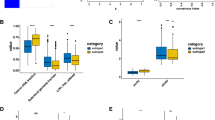Abstract
Background
Squamous cell carcinoma related oncogene expression (SCCRO) correlates with vascular endothelial growth factor-A expression. This data is validated in human lung tumors and provides a putative pathway for angiogenesis in a subset of squamous cell carcinomas. Squamous cell carcinoma related oncogene is a novel oncogene identified by positional cloning of a recurrent amplification at 3q26.3. It is over-expressed in 39.8% of lung, head and neck, cervical, and ovarian carcinomas. SCCRO imparts an aggressive phenotype to affected cancers, which may be related to increased angiogenesis due to SCCRO expression. Our previous work has demonstrated a link between SCCRO and vascular endothelial growth factor-A (VEGF-A) expression in vitro, suggesting a mechanism for SCCRO-induced angiogenesis. The present study aims to confirm and validate this link between SCCRO and VEGF-A expression in an ex vivo human tumor cohort.
Methods
Fresh tissue was collected at Memorial Sloan-Kettering Cancer Center from 34 patients undergoing primary resection of lung squamous cell carcinomas. RNA was extracted from this tissue, reverse-transcribed, and real-time polymerase chain reaction (RT-PCR) was carried out using a BioRad iQ iCycler with SYBR green fluorophore. Microvessel counting was performed on the tumor specimens using CD34 immunohistochemistry.
Results
The expression of both SCCRO and VEGF-A mRNA varies widely in both tumor and normal tissue. SCCRO and VEGF-A co-expression was significantly correlated (R2 = 0.63; P < 0.032). Microvessel counts were not associated with expression of SCCRO or VEGF-A and failed to significantly predict survival. VEGF-A expression in this patient group is a predictor of overall survival (P < 0.032).
Conclusions
VEGF-A expression correlates with SCCRO expression in these primary human lung squamous cell carcinomas and is a predictor of clinical behavior. This data supports the association of SCRRO and VEGF-A in the induction of angiogenesis.
Similar content being viewed by others
REFERENCES
Deleted in proof.
Singh B, Gogineni SK, Sacks PG, et al. Molecular cytogenetic characterization of head and neck squamous cell carcinoma and refinement of 3q amplification. Cancer Res 2001;61:4506–13.
Squire JA, Bayani J, Luk C, et al. Molecular cytogenetic analysis of head and neck squamous cell carcinoma: By comparative genomic hybridization, spectral karyotyping, and expression array analysis. Head Neck 2002;24:874–87.
Brieger J, Jacob R, Riazimand HS, et al. Chromosomal aberrations in premalignant and malignant squamous epithelium. Cancer Genet Cytogenet 2003;144:148–55.
Tremmel SC, Gotte K, Popp S, et al. Intratumoral genomic heterogeneity in advanced head and neck cancer detected by comparative genomic hybridization. Cancer Genet Cytogenet 2003;144:165–74.
Singh B, Stoffel A, Gogineni S, et al. Amplification of the 3q26.3 locus is associated with progression to invasive cancer and is a negative prognostic factor in head and neck squamous cell carcinomas. Am J Pathol 2002;161:365–71.
Saaristo A, Karpanen T, Alitalo K. Mechanisms of angiogenesis and their use in the inhibition of tumor growth and metastasis. Oncogene 2000;19:6122–9.
Rak J, Yu JL, Kerbel RS, Coomber BL. What do oncogenic mutations have to do with angiogenesis/vascular dependence of tumors?. Cancer Res 2002;62:1931–4.
Hanahan D, Weinberg RA. The hallmarks of cancer. Cell 2000;100:57–70.
Folkman J. Tumor angiogenesis: therapeutic implications. N Engl J Med 1971;285:1182–6.
Jain RK. Normalizing tumor vasculature with anti-angiogenic therapy: a new paradigm for combination therapy. Nat Med 2001;7:987–9.
Yancopoulos GD, Davis S, Gale NW, Rudge JS, Wiegand SJ, Holash J. Vascular-specific growth factors and blood vessel formation. Nature 2000;407:242–8.
Breier G, Albrecht U, Sterrer S, Risau W. Expression of vascular endothelial growth factor during embryonic angiogenesis and endothelial cell differentiation. Development 1992;114:521–32.
Cohen T, Gitay-Goren H, Sharon R, et al. VEGF121, a vascular endothelial growth factor (VEGF) isoform lacking heparin binding ability, requires cell-surface heparan sulfates for efficient binding to the VEGF receptors of human melanoma cells. J Biol Chem 1995;270:11322–6.
Shima DT, Kuroki M, Deutsch U, Ng YS, Adamis AP, D’Amore PA. The mouse gene for vascular endothelial growth factor. Genomic structure, definition of the transcriptional unit, and characterization of transcriptional and post-transcriptional regulatory sequences. J Biol Chem 1996;271:3877–83.
O-charoenrat P, Rhys-Evans P, Eccles SA. Expression of vascular endothelial growth factor family members in head and neck squamous cell carcinoma correlates with lymph node metastasis. Cancer 2001;92:556–68.
Shimada H, Takeda A, Nabeya Y, et al. Clinical significance of serum vascular endothelial growth factor in esophageal squamous cell carcinoma. Cancer 2001;92:663–9.
Sauter ER, Nesbit M, Watson JC, Klein-Szanto A, Litwin S, Herlyn M. Vascular endothelial growth factor is a marker of tumor invasion and metastasis in squamous cell carcinomas of the head and neck. Clin Cancer Res 1999;5:775–82.
Mineta H, Miura K, Ogino T, et al. Prognostic value of vascular endothelial growth factor (VEGF) in head and neck squamous cell carcinomas. Br J Cancer 2000;83:775–81.
Rozen, S, Skaletsky H. Primer3 program. Available at: http://www.genome.wi.mit.edu/cgi-bin/primer/primer3_www.cgi. Accessed April 24, 2002.
Qiagen Operon Toolkit. Available at: http://oligos.qiagen.com/oligos/toolkit.php. Accessed April 24, 2002.
BLAST analysis. Available at: http://www.ncbi.nlm.nih.gov/BLAST. Accessed April 24, 2002.
Pfaffl MW. A new mathematical model for relative quantification in real-time RT-PCR. Nucleic Acids Res 2001;29:e45.
Schmittgen TD, Zakrajsek BA. Effect of experimental treatment on housekeeping gene expression: validation by real-time, quantitative RT-PCR. J Biochem Biophys Methods 2000;46:69–81.
Weidner N, Seminple JP, Welch WR, Folkman J. Tumor angiogenesis and metastasis-correlation in invasive breast carcinoma. N Engl J Med 1991;324:1–8.
Masuya D, Huang C, Liu D, et al. The intratumoral expression of vascular endothelial growth factor and interleukin-8 associated with angiogenesis in nonsmall cell lung carcinoma patients. Cancer 2001;92:2628–38.
Tanaka F, Ishikawa S, Yanagihara K, et al. Expression of angiopoietins and its clinical significance in non-small cell lung cancer. Cancer Res 2002;62:7124–9.
Tsoli E, Zacharatos P, Dasiou-Plakida D, et al. Growth index is independent of microvessel density in non-small-cell lung carcinomas. Hum Pathol 2002;33:812–8.
Author information
Authors and Affiliations
Corresponding author
Rights and permissions
About this article
Cite this article
Talbot, S.G., O-charoenrat, P., Sarkaria, I.S. et al. Squamous Cell Carcinoma Related Oncogene Regulates Angiogenesis through Vascular Endothelial Growth Factor-A. Ann Surg Oncol 11, 530–534 (2004). https://doi.org/10.1245/ASO.2004.03.014
Received:
Accepted:
Issue Date:
DOI: https://doi.org/10.1245/ASO.2004.03.014




